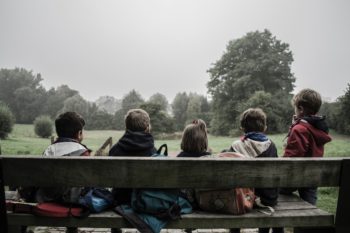 A new report into the state of children’s rights in England strongly criticises the UK Government’s decision to increase the number of 100% religiously selective faith schools in England, and raises concerns about faith-based carve-outs in Relationships and Sex Education (RSE).
A new report into the state of children’s rights in England strongly criticises the UK Government’s decision to increase the number of 100% religiously selective faith schools in England, and raises concerns about faith-based carve-outs in Relationships and Sex Education (RSE).
The annual report, which includes evidence submitted by Humanists UK, was produced by the Children’s Rights Alliance for England and assesses how well Government policies respect children’s rights. This year’s report coincides with the 30th anniversary of the United Nations Convention on the Rights of the Child (UNCRC).
Humanists UK welcomes the findings of the report which, amongst other things, highlights the importance of retaining the 50% cap on faith-based admissions in free schools and criticises the policy to allow fully religiously selective voluntary aided schools to open instead. Here the report notes the ‘wealth of evidence’, much of which featured in Humanists UK’s contribution to a call for evidence last year, showing that ‘religious selection has a disproportionate impact on the accessibility of good schools to children for particular ethnic groups and lower socio-economic backgrounds’. It goes on to recommend that the policy should be dropped.
With respect to RSE, the report praises the Government’s decision to make the subject statutory in schools, but questions the decision to permit religious schools to amend the content of the subject in line with the tenets of their faith. Instead it recommends that, ‘the Government should make sure that regardless of the religious character of the school, [Relationships Education] and RSE provides children with comprehensive, accurate and unbiased information.’
Humanists UK Education Campaign Manager Ruth Wareham commented: ‘The annual State of Children’s Rights Report provides us with a welcome reminder of the progress that has been made in children’s rights since the UNCRC was adopted by the United Nations 30 years ago. Through policies such as statutory Relationships and Sex Education, we are starting to see changes that reflect the fact that children are not simply an extension of their parents, but are individual human beings with their own rights and needs.
‘However, the report also illustrates that there is still a great deal of work to be done, especially in areas at the intersection between education and religion. In particular, it is vital that all children grow up in diverse schools where they are able to learn with and from others of all different backgrounds, as all the best evidence shows that this is what leads to a tolerant, cohesive, society. It is also crucial that they all receive full, comprehensive, and developmentally-appropriate relationships and sex education, because this is the best route to ensure that young people and adults are healthy, happy, and safe.
‘In order for adequate progress to be made towards ensuring that children’s rights are fully respected, we urge the Government to adopt the report’s recommendations in their entirety.’
NOTES
For more information contact Humanists UK press manager Casey-Ann Seaniger at casey@humanists.uk or phone 020 7324 3078.
To read Humanists UK’s response to the CRAE’s call for evidence for the report visit:
To read our most recent news story on selective voluntary aided schools see:
To read our latest news item on statutory RSE visit:
https://humanists.uk/2019/02/25/humanists-uk-welcomes-government-guidance-on-rse/
At Humanists UK, we advance free thinking and promote humanism to create a tolerant society where rational thinking and kindness prevail. Our work brings non-religious people together to develop their own views, helping people be happier and more fulfilled in the one life we have. Through our ceremonies, education services, and community and campaigning work, we strive to create a fair and equal society for all.
